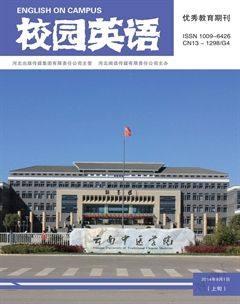Two effective ways to improve the teaching of English speaking in Secondary School in China
黄晓丽 董丽哲

【Abstract】Speaking is very essential for second language learners. The discussion aimed to highlight two effective ways to improve the teaching of speaking in secondary school in China.
【Key words】effective ways, teaching English speaking, secondary school
In order to improve speaking in the English language classroom in secondary school in China, it is necessary to consider two important issues: The backwash effect of testing and the need to change this, what should be taught in speaking class.
Davies (1968: 5) claims that “the good test is an obedient servant since it follows and apes the teaching”. Because of the enormous intended wash back of English tests on teaching English in secondary schools, so adding speaking section not only in MET but also in end-of-term exams should be taken into consideration. Besides that, the speaking tests should also be practical, reliable and valid. International English Language Testing System (IELTS) and Test of English as a Foreign Language (TOEFL) are two of the most important English level tests in the world. Unlike that of TOEFL, the speaking test of IELTS is an eleven to fourteen minutes three parts face to face oral interview with an examiner, which includes: introduction and interview, individual long turn and two-way discussion. However, because “speaking is not naturally language focused, rather it is people focused” (Hughes 2002: 77),the interactivity of ‘question and answer interview in IELTS speaking test is far from being enough comparing with “people focused” Graded Examinations in Spoken English (GESE). In GESE, the candidates not only can prepare a topic of his or her choice, but also can exchange information, ideas and opinions with the examiner in a meaningful and authentic way. This would likely to be used for reference in our future speaking tests. https://www.teachers.cambridgeesol.org/ts/exams/academicandprofessional/ielts/speaking http://www.trinitycollege.co.uk/site/?id=1803
As English language teachers, we must have a clear idea about what should be taught in speaking class. According to Thornbury (2005), speaking serves both a transactional function and an interpersonal function, the purpose of the former one is to facilitate the exchange of services or goods and convey information, while the aims of the latter one are to establish and keep social relations. So teaching speaking should not be limited to grammar and pronunciation, and there is a lot more to consider: linguistic knowledge and extralinguistic knowledge (Thornbury, 2005). The following table is a brief description of linguistic knowledge that English language teachers should consider when teaching speaking.
Table2: A summary of linguistic knowledge in the teaching of speaking
Besides that, Purba (2011) believes that Language and culture are two inseparable entities. So when teaching speaking, social and culture rules as extralinguistic knowledge should also be embedded.
The key to success for Chinese secondary school students should not be passing an English test successfully, but to become a fluent and excellent user of English in their academic study and in their future career. So, adding speaking section in both examination and English language teaching should be put into effect.
References:
[1]Hughes, R.(2002),Teaching and Researching Speaking, London: Longman.
[2]Cambridge Assessment (nd), http://www.chinaielts.org/guide/sample_questions.shtml#f [Access date 27th November 2013].
[3]Davies,A.(1968), Language Testing Symposium: A Psycholinguistic Approach, London: Oxford University Press.
[4]Purba, H.(2011),“The Importance of Including Culture in EFL Teaching”, Journal of English teaching, Vol.1, No. 1, p.44
[5]Trinity College London(nd), http://www.trinitycollege.co.uk/site/?id=1803 [Access date 27th November 2013].
[6]Thornbury,S.(2005),How to teach speaking, Harlow: Longman.

